Electronic Health Records (EHR) have revolutionized the healthcare industry by streamlining data management, improving patient care, and enhancing overall operational efficiency. As technology continues to advance at a rapid pace, EHR trends are constantly evolving, shaping the future of healthcare. In this comprehensive guide, we will explore the latest EHR trends that modern healthcare organizations need to be aware of to stay ahead in today’s competitive healthcare landscape.
Navigating the Latest EHR Trends for Modern Healthcare Organizations
As technology continues to advance, new EHR trends are emerging, shaping the future of healthcare. Here are some of the most important EHR trends for modern healthcare organizations to keep an eye on:
1. Interoperability
Interoperability is the ability of different EHR systems to exchange and use patient data seamlessly. In recent years, there has been a growing focus on achieving interoperability among different EHR platforms. Modern healthcare organizations are increasingly adopting EHR systems that are interoperable, allowing for smooth data exchange between different healthcare providers, departments, and systems. This trend enables healthcare organizations to have a more comprehensive view of a patient’s medical history, resulting in improved care coordination and better patient outcomes.
2. Artificial Intelligence (AI) and Machine Learning
AI and ML are revolutionizing the healthcare industry, and EHRs are no exception. EHRs are now being integrated with AI and ML technologies to automate tasks such as data entry, documentation, and predictive analytics. AI-powered EHRs can analyze vast amounts of patient data to identify patterns, trends, and insights that can help healthcare providers make more informed decisions about patient care. For example, AI algorithms can analyze patient data to detect early signs of diseases, predict patient outcomes, and personalize treatment plans.
3. Telehealth and Remote Patient Monitoring
The COVID-19 pandemic has accelerated the adoption of telehealth and remote patient monitoring, and EHRs are adapting to support these trends. EHRs are now being integrated with telehealth platforms, enabling healthcare providers to conduct virtual visits, exchange patient data remotely, and monitor patients remotely. This has expanded access to healthcare services, especially for patients in rural or remote areas, and has improved the efficiency of care delivery.
4. Patient Engagement
Patient engagement has become a crucial aspect of modern healthcare, and EHRs are playing a significant role in facilitating patient engagement. Today’s EHRs are designed to empower patients by giving them access to their own health records, allowing them to view their medical history, schedule appointments, communicate with their healthcare providers, and participate in their own care plans. Patient engagement through EHRs can lead to better patient satisfaction, improved patient outcomes, and increased patient adherence to treatment plans.
5. Data Security and Privacy
With the increasing reliance on EHRs to store and manage patient data, data security and privacy have become critical concerns for modern healthcare organizations. EHR vendors are constantly improving the security features of their systems to protect patient data from cyber threats, unauthorized access, and breaches. This includes robust authentication and authorization mechanisms, data encryption, audit trails, and regular security updates. Compliance with regulations such as the Health Insurance Portability and Accountability Act (HIPAA) and the General Data Protection Regulation (GDPR) is also a top priority for EHR vendors. Health Insurance Portability and Accountability Act (HIPAA), and maintain patient trust.
6. Cloud-Based EHR Technology
Cloud-based EHRs are gaining popularity due to their scalability, accessibility, and cost-effectiveness. Cloud-based EHRs allow healthcare organizations to store and manage patient data in secure offsite servers, eliminating the need for costly on-premises infrastructure. Cloud-based EHRs also enable seamless data sharing and collaboration among healthcare providers, making them an attractive option for modern healthcare organizations that need to collaborate across multiple locations or with external partners.
The Bottom Line
EHRs are evolving rapidly, and the trends mentioned above will continue to shape the future of healthcare. By taking advantage of these technologies and integrating them into their EHRs, healthcare organizations can improve patient care, increase efficiency, and reduce costs. As EHR vendors continue to innovate and develop new features and capabilities, it’s clear that Electronic Health Records will continue to play a critical role in modern healthcare.
If you are looking for an best EHR implementation consultant, Contact MedicalITG. We provide end-to-end services to ensure that your practice is running smoothly and efficiently. Get in touch with us via email info@medicalitg.com or call (877) 220-8774!










